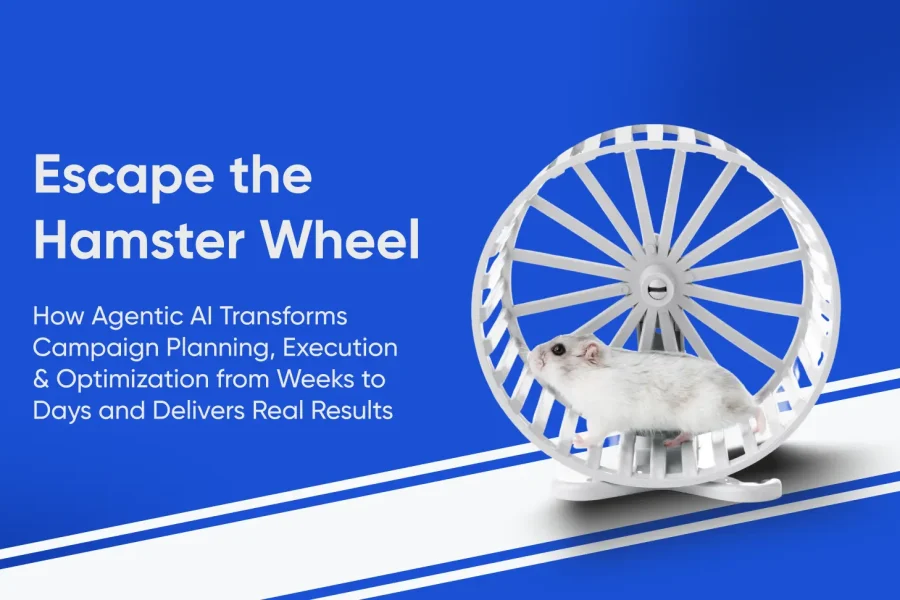Remember the marketing hamster wheel?
That relentless cycle where your talented team runs faster and faster but somehow stays in the same place, drowning in spreadsheets, wrestling with disparate systems and watching opportunities pass by while buried in execution details.
In our previous conversations, we’ve diagnosed the problem:
And Introduced the Solution:
Now let’s get practical:
- Exactly how does this technology transform your marketing workflow from a months-long marathon into a streamlined sprint, without replacing your team or disrupting your existing systems?
The Marketing Campaign Lifecycle: The Time Sink of Modern Marketing
The traditional marketing campaign process is a masterclass in inefficiency. Gartner’s 2024 Campaign Planning Benchmarks states that the median time from brief to launch for enterprise campaigns is 8-12 weeks¹. That’s up to three months before you even begin measuring results.
Let’s break down where all that time disappears:
-
The Planning Phase: Drowning in Data, Starving for Insights
Your strategy meetings should be dynamic think tanks where brilliant minds collaborate on market-changing ideas. Instead, they’ve become tedious data review sessions focused primarily on understanding past performance.
According to IDC’s 2024 Data & Analytics Planning Guide, analytical professionals spend a staggering 80% of their time on data discovery, preparation, and governance with less than 20% left for actual analysis. That’s four-fifths of working hours spent not on deriving insights, but simply getting data ready to analyze.
The human cost is substantial:
- Strategists become data janitors
- Creatives become report compilers
- Everyone experiences the frustration of knowing what they could accomplish with more time for real strategy
Now let’s move to the Second Step–>
-
The Execution Phase: The Cross-Functional Obstacle Course
Once a campaign is finally approved, the real hurdles begin. Creative development, compliance reviews, channel setup, audience segmentation, asset preparation. Each step introduces new delays and handoffs.
Forrester’s 2023 Marketing Process Survey reveals that 62% of marketers cite “cross-team process complexity” as their top execution challenge. The average marketer juggles 8+ different technology platforms, creating a patchwork of non-integrated systems that rarely communicate effectively.
The execution bottlenecks are predictable:
- Every handoff introduces delay
- Every manual upload creates opportunity for error
- Every platform requires its own expertise
No wonder the race to market feels like running through quicksand.
-
The Optimization Phase: Too Little, Too Late
Perhaps most painful is the optimization phase where golden opportunities for improvement are identified only after significant budget has already been spent.
The CMO Council’s 2023 Predictive Analytics Adoption study reveals that only 27% of marketers act on data insights within one day; the majority still operate on weekly or monthly optimization cycles⁴. By the time adjustments are implemented, precious budget has already been wasted on underperforming tactics.
It’s like having a car that only tells you it needs oil after the engine has seized.
Breaking the Cycle: How Agentic AI Transforms Each Phase
Human-in-the-loop Agentic AI doesn’t just speed up existing processes, it fundamentally transforms how your team works at each stage of the campaign lifecycle.
Let’s see exactly how:
Planning Transformation: From Data Wrangling to Strategic Thinking
Traditional Approach (2-3 weeks):
- Manually extract data from multiple platforms
- Reconcile inconsistencies and create reports
- Develop insights based on limited historical data
- Make decisions based on incomplete information
Agentic AI Approach (2-3 days):
- AI automatically gathers, cleans, and harmonizes data across platforms
- Pre-analyzed insights packages await human review
- Pattern detection identifies opportunities humans might miss
- Humans focus on strategic decision-making, not data preparation
According to Salesforce’s State of Marketing Report, organizations using AI for marketing data analysis report 37% improvement in their ability to quickly derive actionable insights from marketing data.
Execution Transformation: From Digital Assembly Line to Creative Powerhouse
Traditional Approach (4-6 weeks):
- Manual creation and adaptation of assets for each channel
- Sequential handoffs between teams
- System-by-system implementation
- Quality checks that catch errors after they’ve multiplied
Agentic AI Approach (3-5 days):
- AI drafts initial creative variants based on successful patterns
- Humans refine and improve AI suggestions
- Parallel workflows with AI handling routine implementation
- Predictive quality checks flag potential issues before they occur
Forrester’s Total Economic Impact™ Study of AI in Creative Workflows found that creative teams using AI assistance reduce production time by up to 58% for campaign assets⁶, allowing human creatives to focus on strategy and brand storytelling rather than repetitive production tasks.
Optimization Transformation: From Rear-View Mirror to Real-Time Navigation
Traditional Approach (Weekly or monthly cycles):
- Periodic performance review meetings
- Manual analysis of what’s working/not working
- Delayed implementation of optimizations
- Learning limited to the campaign in question
Agentic AI Approach (Continuous):
- 24/7 performance monitoring with real-time alerts
- AI-suggested optimization opportunities for human approval
- Immediate implementation of approved changes
- Cross-campaign pattern recognition for continuous improvement
Research from the CMO Council found that teams using AI-powered optimization see an average 25% improvement in campaign ROI compared to those using traditional methods, not because the AI makes better decisions than humans, but because it enables humans to make more decisions, faster.
The Business Impact: Research-Backed Benefits
Agentic AI doesn’t just change how marketing teams work, it transforms business outcomes.
Here’s what industry research tells us about the potential impact:
-
Time-to-Market Acceleration
The Boston Consulting Group’s research on AI in marketing found that companies with advanced AI integration reduce campaign development cycles by 30-50%. This acceleration isn’t just about efficiency, it’s about competitive advantage in fast-moving markets.
-
Resource Utilization Improvement
Deloitte’s Marketing Technology Implementation Survey found that marketing teams using AI assistance report a 35% increase in productive time spent on strategic activities. Your existing team can accomplish significantly more without adding headcount.
-
Campaign Performance Enhancement
McKinsey’s analysis of AI in marketing indicates that companies using AI for campaign optimization see a median improvement of 20% in marketing ROI. That’s a direct bottom-line impact that any CFO would appreciate.
The Implementation Journey: Evolution, Not Revolution
The transition to Agentic AI doesn’t require dismantling your current marketing organization or technology stack.
Tatvic’s approach focuses on integration, enhancement, and evolution keeping humans at the center while freeing them from digital drudgery.
Our implementation typically follows three phases:
Phase 1: Quick Wins (30-60 days)
- Assessment of your current workflow
- Integration with existing systems
- Implementation of initial agents focused on data preparation and reporting
- Measurable time savings within the first month
Phase 2: Workflow Transformation (60-90 days)
- Training of core team members
- Expansion to execution and optimization processes
- Refinement based on human feedback
- Significant reduction in campaign lifecycle time
Phase 3: Strategic Evolution (90+ days)
- Full adoption across marketing workflows
- Cross-campaign learning and optimization
- Continuous improvement of AI capabilities
- Human focus shifts primarily to strategy and innovation
Throughout this journey, your team remains in control, making all strategic decisions, approving all recommendations, and teaching the AI to better support your unique marketing approach.
Beyond Time Savings: The Real Business Impact
While reducing your campaign lifecycle from months to days is impressive, the true business impact extends far beyond efficiency:
- Market Responsiveness: Respond to competitive moves or market shifts in days instead of months
- Budget Effectiveness: Eliminate waste by optimizing in real-time instead of after the fact
- Team Satisfaction: Marketing talent stays engaged when freed from routine tasks
- Innovation Capacity: With more time for strategic thinking, breakthrough ideas emerge
- Organizational Agility: Your entire business becomes more responsive to market opportunities
As Gartner notes in their Marketing Technology Survey, marketing organizations that successfully implement AI assistance report 32% higher employee satisfaction and 28% lower staff turnover compared to those that don’t.
Your Next Step: From Concept to Reality
In our next article: “The Agentic AI Sweet Spot: Where Can Autonomous Agents Drive Maximum ROI in Your Marketing Now?”
We’ll help you identify the highest-impact starting points for your Agentic AI journey.
You’ll learn how to prioritize implementation areas based on your specific business challenges and existing technology landscape.
We’ll show where early adopters are realizing 18-25% lift in ROAS within 90 days.
Until then, consider what your marketing organization might accomplish if freed from the hamster wheel of manual execution.
What market opportunities could you seize? What creative breakthroughs might emerge? What competitive advantages could you develop?
The answers to these questions represent the true promise of Agentic AI, not just doing things faster, but doing things that were never possible before.


